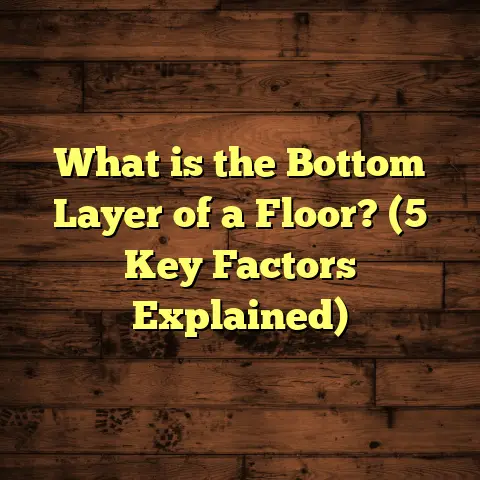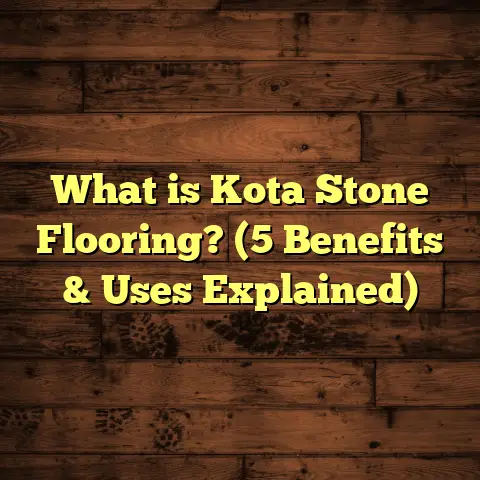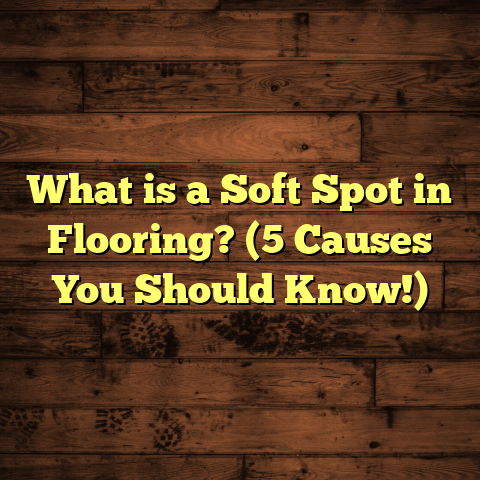What is Epoxy Resin Flooring? (5 Benefits for Durable Spaces)
Investing in your flooring is one of those decisions that can impact your space for decades. Over the years, I’ve seen how the right floor choice can save money, reduce headaches, and even raise the style level of any room. Among all the options I’ve worked with, epoxy resin flooring consistently stands out. It’s tough, versatile, and surprisingly stylish if done right. If you’re wondering what makes epoxy flooring a solid choice for durable spaces and why so many people are turning to it, let me walk you through everything I’ve learned—from the basics to some insider tips and real-world stories.
What is Epoxy Resin Flooring?
Let’s start with the basics: what exactly is epoxy resin flooring? At its core, epoxy flooring is a coating made by mixing two components—resin and hardener—that chemically react to form a rigid plastic material. When this mixture is applied over concrete floors (or other substrates), it creates a seamless, durable surface that becomes part of the floor itself rather than just sitting on top.
I remember my very first epoxy flooring project like it was yesterday. A local auto shop had their concrete floor cracking and staining constantly from oil spills. They wanted something that wouldn’t just hide the mess but would actually fight it. After applying epoxy resin flooring, not only did the floor look brand-new, but it also resisted future stains like a champ. That experience opened my eyes to how transformative this material can be.
Chemically speaking, epoxy is part of a group of polymers called thermosets. Once the resin and hardener mix, they undergo polymerization—a process that forms long molecular chains making the material extremely tough and resistant to wear. This curing process typically takes a few days to fully harden but results in a surface much stronger than untreated concrete.
Epoxy coatings come in various formulations depending on the intended use—some are designed for chemical resistance, others for slip-resistance, or fast curing for quick turnaround projects. This flexibility makes epoxy resin flooring suitable for garages, warehouses, hospitals, commercial kitchens, retail stores, and even modern residential spaces.
1. Extreme Durability That Pays Off Over Time
Durability is where epoxy resin flooring really shines. When clients come to me frustrated with floors that chip, crack or stain easily, epoxy is often my go-to recommendation.
Imagine a busy factory floor where heavy machinery rolls back and forth constantly or a warehouse with pallets stacking high and forklifts zooming around. Traditional concrete might chip or get scratched quickly under these conditions. Epoxy floors offer an extra layer of protection that can withstand significant mechanical stress without cracking.
I once worked on a distribution center where the managers were tired of patching their concrete floors every year. After installing epoxy resin flooring with a thickness of about 3-4 mm over their existing concrete slab, they reported zero damage after two years despite heavy forklift use. The investment saved them thousands of dollars in repairs and downtime.
Some studies show that well-installed epoxy floors can last anywhere from 10 to 20 years or more with minimal upkeep. The key is proper surface preparation before application—if the concrete underneath is well-prepped and free of moisture issues, the epoxy bonds tightly and resists peeling.
Epoxy coatings also offer excellent abrasion resistance compared to other floor types. Testing using the Taber abrasion test—a standard method to measure wear resistance—shows epoxy loses only about 20-30 mg under heavy abrasion cycles. To put that in perspective, regular concrete loses significantly more mass under similar testing conditions.
This durability isn’t just about resisting wear—it also means your floor maintains its integrity under impact and heavy loads. For example, in automotive repair shops where tools may drop or vehicles park daily, epoxy floors avoid chipping and crumbling common with bare concrete.
2. Aesthetic Versatility That Surprises Clients
When I mention epoxy flooring’s durability to clients, many imagine dull gray industrial floors with no personality. But nothing could be further from the truth.
One of my favorite parts about working with epoxy resin flooring is how customizable it is visually. You can literally tailor colors, patterns, textures, and finishes to suit any style or environment.
For instance, I helped a client who was opening a boutique fitness studio. They wanted something modern but inviting underfoot. We chose a neutral beige base with metallic flakes embedded into the surface to give it subtle sparkle when hit by light. The end result was elegant and unique—something that wouldn’t have been possible with traditional floor tiles or plain concrete.
There are several decorative options to consider:
- Solid Colors: Pure tones ranging from bright hues like red or blue to muted earth tones.
- Metallic Epoxy: Using mica powders mixed into the resin creates swirling metallic effects that catch light beautifully.
- Quartz or Flake Additives: These create texture and depth while improving traction.
- Custom Patterns: You can paint or stencil designs onto the floor before sealing with epoxy for artistic flair.
The finish options also range from high-gloss to matte or satin depending on your aesthetic preference. High-gloss finishes are popular in commercial spaces because they reflect light well and enhance brightness.
In fact, according to a 2022 survey by Flooring Today magazine, over 60% of commercial clients who chose epoxy cited design flexibility as one of their main reasons.
What’s more, epoxy floors can be seamless across large areas without grout lines or seams breaking up the look—perfect for creating clean, modern interiors.
3. Maintenance Made Simple—Less Work, More Results
If you hate spending hours scrubbing floors or worrying about stains setting in, epoxy flooring is going to feel like a breath of fresh air.
The surface created by cured epoxy is smooth and non-porous. This means dirt, dust, liquid spills, and stains don’t soak in—they just sit on top until wiped away.
I’ve installed epoxy floors in restaurants where grease splatters are common and in hospitals where cleanliness is paramount—and both environments benefited greatly from how easy these floors are to keep spotless.
Routine cleaning involves simple sweeping or dust mopping followed by damp mopping with mild detergent or neutral pH cleaner. No need for harsh chemicals that might damage other floor types.
A report from the National Floor Safety Institute found that facilities with epoxy coated floors reduced cleaning time by up to 40% over those with traditional tile or carpeted floors.
The seamless nature of epoxy also means no grout lines or cracks where dirt can accumulate—a huge advantage over tile or stone floors.
For businesses concerned about hygiene (dental offices, clinics), this ease of maintenance pairs well with epoxy’s ability to resist bacteria growth due to its impermeable surface.
4. Stands Up Against Chemicals and Stains
Chemical resistance is one area where epoxy resin flooring truly outperforms many other options.
If you’ve ever spilled oil on your garage floor only to see a permanent stain form on concrete or asphalt, you know how frustrating it can be. Epoxy floors handle these spills easily—they prevent penetration and allow quick cleanup.
In an auto repair shop I worked with recently, mechanics were constantly dealing with oil, solvents, brake fluids, and other harsh chemicals that would destroy standard concrete over time. After switching to an industrial-grade epoxy resin floor designed for chemical resistance, staining was no longer an issue—even after years of use.
Epoxy coatings resist many acids (like sulfuric or hydrochloric acid), alkalis (such as ammonia), solvents (acetone), oils, and grease better than uncoated surfaces.
According to research published in the Journal of Protective Coatings & Linings (2023), properly formulated epoxy surfaces showed less than 1% degradation after exposure to common industrial chemicals over six months.
For labs, manufacturing plants dealing with chemicals daily, or garages prone to spills—the chemical resistance of epoxy is a real lifesaver.
5. Enhanced Safety Features You Can Customize
Safety isn’t just about preventing accidents; it’s about giving peace of mind for everyone using your space.
Epoxy floors offer several options for added safety features like anti-slip coatings. By mixing additives such as silica sand or aluminum oxide crystals into the final topcoat layer, you can create textured surfaces that improve grip underfoot.
I installed anti-slip epoxy floors in a busy warehouse where forklift operators often worked in tight spaces on polished concrete before. After applying an anti-slip textured epoxy finish, slip-related incidents dropped noticeably within six months according to safety reports from management.
Besides slip resistance, some epoxy formulations are fire-retardant or have low volatile organic compound (VOC) emissions—which means healthier indoor air quality compared to other synthetic flooring options.
If you have kids at home or run a facility where safety codes must be met (schools or healthcare facilities), these customizable safety features make epoxy floors an excellent choice.
How Epoxy Resin Flooring Compares to Other Flooring Options
To give you better context on why epoxy resin flooring is a standout choice for durable spaces, let me share some comparisons from my experience:
| Flooring Type | Durability | Maintenance | Chemical Resistance | Aesthetic Options | Cost (per sq ft) |
|---|---|---|---|---|---|
| Concrete (sealed) | Moderate | Moderate | Moderate | Limited | $2 – $3 |
| Vinyl | Moderate | Easy | Low | Many colors | $3 – $7 |
| Hardwood | Moderate | Regular upkeep | Low | Classic looks | $6 – $12 |
| Tile | High | Moderate | High | Many designs | $5 – $15 |
| Epoxy Resin | Very High | Very Easy | Very High | Highly customizable | $3 – $12 |
You’ll notice epoxy matches or beats many materials on durability while offering superior chemical resistance and ease of maintenance—plus endless design flexibility that most don’t expect.
Installation Insights: What You Should Know
If you decide epoxy resin flooring might be right for you, here’s what I’ve learned about installation from years on the job:
Preparation is Everything: The success of an epoxy floor depends heavily on how well the existing surface is prepared. Concrete must be clean, dry, and free from oils or contaminants. Sometimes grinding or shot blasting is required for proper adhesion.
Moisture Testing: Moisture vapor transmission through concrete slabs can cause epoxy floors to peel or bubble if not addressed. Testing moisture levels beforehand helps determine if a moisture barrier is needed.
Multiple Coats for Durability: Most installations require at least two coats—a primer coat to bond with concrete followed by one or more topcoats for durability and finish.
Curing Time: Full curing might take several days depending on product type and environmental conditions like temperature and humidity. Rushing this step leads to weak finishes.
Professional vs DIY: While there are DIY kits available for small projects like garage floors, I recommend professionals for large commercial jobs or high-performance needs due to the technical nature of surface prep and application.
Common Mistakes & How to Avoid Them
Having installed dozens of epoxy floors myself and seen others’ mistakes firsthand, let me share some tips so you don’t run into common problems:
- Skipping Surface Prep: Trying to apply epoxy over dirty or wet surfaces leads to peeling.
- Ignoring Moisture Issues: Not testing moisture content before application causes bubbling.
- Applying Too Thick at Once: Thick layers can cure unevenly causing cracks.
- Poor Temperature Control: Applying in too cold/hot conditions affects curing quality.
- Using Wrong Epoxy Type: Industrial-grade versus residential-grade products have different properties—choose wisely based on use case.
Avoiding these pitfalls makes a big difference in how long your floor lasts and how good it looks over time.
Real Client Stories That Speak Volumes
Here are some quick stories from my projects that illustrate how epoxy resin flooring made a difference:
- The Brewery Floor: A craft brewery I worked with had constant moisture on their concrete floor causing mold issues. After installing an anti-slip moisture-resistant epoxy floor system, their cleaning became easier and mold disappeared.
- The Dental Clinic: A dental office needed sterile conditions but wanted a warm look instead of cold tiles. We installed light-colored glossy epoxy with antimicrobial additives that met clinic standards while looking inviting.
- The Home Garage: One homeowner wanted a floor that could handle oil drips but still look stylish. Metallic gray epoxy gave their garage showroom vibes plus stain resistance.
- The School Gymnasium: The gym needed a durable surface that minimized slips during physical activity. Anti-slip textured epoxy coating was installed which improved safety noticeably according to staff reports.
- The Warehouse Upgrade: A logistics center upgraded from worn concrete to thick industrial epoxy flooring which cut maintenance downtime by half within the first year.
Caring for Your Epoxy Floor: Tips That Help It Last
Taking care of your new epoxy floor doesn’t have to be complicated:
- Sweep regularly to remove abrasive dirt particles.
- Mop periodically with mild detergent—avoid acidic cleaners which might dull the finish.
- Clean spills immediately especially oil or chemicals.
- Use protective mats under heavy equipment when possible.
- Avoid dragging sharp objects across the floor.
- Consider reapplying a clear coat every few years if wear starts showing.
Following these simple steps can keep your floor looking great and performing well for years beyond initial expectations.
Cost Considerations: Is It Worth It?
Cost always comes up when talking about flooring investments. Epoxy resin flooring costs vary widely depending on factors like thickness required, surface prep needed, additives used (like anti-slip), and geographical location.
On average:
- Basic residential garage floors start around $3–$7 per square foot.
- Commercial-grade systems for warehouses or factories range between $7–$12+ per square foot due to thicker coatings and special formulations.
- Decorative metallic finishes tend toward higher end due to labor intensity.
While this might seem steep compared to vinyl or basic concrete sealing initially, consider how long these floors last without repairs plus savings on maintenance costs over time.
In my experience helping clients budget their flooring projects using tools like FloorTally has been invaluable—they give detailed estimates factoring in local labor/material rates which help avoid surprises.
Final Thoughts From My Experience
Choosing the right flooring material isn’t just about looks—it’s about matching your lifestyle or business needs with practical performance. Epoxy resin flooring fits that bill perfectly for anyone needing longevity combined with style and easy upkeep.
If you want a floor that stands strong against wear and chemicals while offering design freedom—epoxy resin flooring deserves serious thought. I hope sharing my stories and data helps you make an informed decision you feel good about investing in because good floors pay dividends for years.
Got questions? Feel free to ask—I’m always happy to share advice tailored to your unique space!





